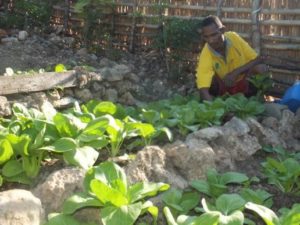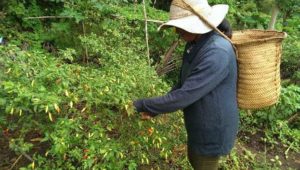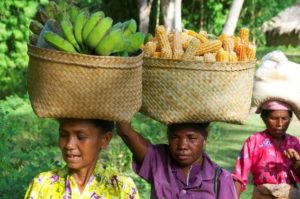Commissioned by: German Federal Ministry for Economic Cooperation and Development
Lead executing agency: Ministry of Agriculture and Fisheries (MAF)
Duration: 10/2012– 03/2016
Gender Marker: 1
0. Introduction
As a new independent country (2002), Timor-Leste is facing a range of development challenges such as high
levels of poverty, a lack of trained human resources, a lack of job and income generating opportunities and
other socio-economic constraints. The country has one of the highest fertility rates in the world with each woman
having on average 6.95 children. Gender relations are significantly influenced by local systems of traditional
laws, which dictate gender-specific rights and obligations. There exists much heterogeneity across social
classes, districts and ethnic groups; the country has a multitude of local traditions and beliefs. Domestic violence
is widespread, 38% of women in Timor-Leste over the age of 15 have experienced physical violence. The
Timorese government has taken numerous measures to address gender inequality; among others through
policy reform, legislation, institutional mechanisms and public awareness campaigns.
1. Background of the project
The programme “Sustainable Management of Agro-Biodiversity in Timor-Leste” promotes the protection of
biodiversity in agriculture applying a gender specific methodology. Sustainable use of local species, varieties,
and landraces as well as the application of biodiversity-friendly farm practices are implemented taking into
account specific needs of women and men. The target group are female and male farmers, who use natural
resources or will use them in the future (children and youth). The majority of the target groups are supported
through farmer field schools. The economic use of ABD increases food security and offers additional gender
differentiated income possibilities from value chains of native species. Main project partners are the Timorese
Ministry of Agriculture and Fishery (MAF), the Ministry of Commerce, Industry and Environment (MCIE) through
its National Directorate of Biodiversity as well as the national NGO PERMATIL and the University of TimorLeste (UNTL). Through a stepwise approach the project supports the mainstreaming of Timor-Leste’s National
Biodiversity Strategy and Action Plan in order to maintain agro-biodiversity (ABD) and thereby to improve food
security, a more balanced nutrition and adaptation to climate change.
Both, women and men, play a crucial role in agro-biodiversity as they have their traditional gender-roles and
functions in their farming systems on the one hand, and their gender-specific skills and knowledge regarding
agro-biodiversity on the other hand. As in other sectors, the assignment of tasks and responsibilities in
agriculture is gender specific.
2. Approach and Methodology
Giving women and men equal voice and access to activities, roles and functions as well as new technologies
can provide better results and increase the sustainability. A gender-based approach was chosen in order:
To provide gender segregated space for men and women to articulate their needs and priorities, to create
self-confidence, to participate in decision-making and prioritize activities, e.g. in in-situ-cultivation.
To include senior male and female farmers in order to appreciate their traditional knowledge regarding ABD
and pass it on to younger generations (e.g. the cultivation of ancient nutritious and climate resilient crops,
such as Job’s Tears, Coix lachryma-jobi).
To allow both sexes to benefit from non-monetary effects of sustainable ABD management (e.g. balanced
nutrition and improved food security) and from monetary income from value-added products of native
species.
To empower both rural women and men in society to demand agricultural service delivery by private and
government extension service providers.
To create gender awareness at partners’ level in order to provide extension services in a gender-balanced
way and allow for a balanced participation of men and women in the use of new technologies.
The following principles are considered in all project steps:
All ABD-project steps in the field are carried out – together with the partners – in a genderdifferentiated way during group works and Participatory Rapid Appraisal (PRA) activities.
Female and male group results are brought to plenary for joint discussion and final decision-making.
Criteria for group formation and farmer field school trainers include gender balance.
Value chain development (VCD) and access to new technologies (e.g. seed storage containers,
solar dryers) focus on equal participation of women and men.
Some VCD-products, such as a syrup from a wild sugar palm, is predominantly produced by women.
A female farmer and a female extension worker are providing training to other farmer’s groups.
Both women and men participate actively in the monitoring of the agro-biodiversity in their village.
Women are encouraged to take over leadership functions.
All activities are documented in a gender-differentiated way.
3. Activities
Sensitization on agro-biodiversity (ABD)
The stepwise approach of the project starts with a one-day-community sensitization on the nature and
importance of ABD and the methodology and support provided by the project implementation team. The latter
is composed by the national agricultural extension staff, the GIZ/AMBERO-IP-NIRAS team, the national NGO
PERMATIL, and the University of Timor-Leste. During this first contact with the communities, groups of women
and men are separately asked to draw resource maps of the natural resources in their village, in order to deepen
the understanding of agro-biodiversity and the need to use and protect it. The maps produced by groups of men
and women are often not identical but rather complementary. In plenary sessions men and women discuss the
different maps and priorities chosen.
Group formation
Those participants of the sensitization events, who are interested in managing their ABD are supported in
forming a farmers’ group. Extension workers facilitate the group formation together with the GIZ/AMBERO-IPNIRAS team. The groups are formed for joint learning and skills development on ABD. Group membership is
following criteria, e.g. balanced participation of both, women and men, young and older farmers. All groups
select their leadership structure. They are encouraged to select not only men, but also women to take leading
positions. Men have great trust in women’s’ financial skills and honesty and often ask women to be the cashier.
ABD-Assessment
Farmers and the implementing team jointly assess the agro-biodiversity in the village. In focus group discussions
women and men discuss the existing ABD, species or varieties they have lost, and other challenges they face.
Subsequently, women and men carry out transect walks through their farming area in separate groups, males
accompanied by a male and women accompanied by a female facilitator. In these group walks, women and
men explain about plants and crops they come across, their use, abundance etc. As a third step, women and
men groups list the species and varieties in their village, including wild plants, herbs, spices and medicinal plants
they use. The results of group walks and participatory group listings are presented in the plenary by both men
and women.
Farmers Groups Plant Register and ABD-database
The participation of women and men is documented and mapped separately. The plant lists prepared by the
community groups are compiled as a plant register of the village, outlining not only availability and abundance
of plants, but also their use and access by women and men. All information is underpinned by GPS data. The
plant registers are compiled into an ABD plant database, which is managed at national level. 554 plant varieties
in 26 villages have been documented.
Participatory Planning
Based on the results of the plant assessment, farmer groups plan and prioritize their implementation activities
and training contents. This planning process is facilitated by the implementation team. After plenary discussions,
female and male groups split up and discuss their needs and priorities. In those gender-segregated groups
women and men have their protected room, in which they can openly discuss and voice their problems,
experiences and priorities. While women in open community or official discussions traditionally tend to follow
decisions taken by men, they are able to discuss and take own decisions in their gender group. In the plenary,
women can learn to defend their views and decisions. Activities chosen by farmer groups have been the
installation of demonstration plots, training on biodiversity-friendly cultivation practices, in situ cultivation,
nutritious gardens, water conservation, community seed banks, nurseries and seed fairs.
ABD-Training of Trainers (ToT) and Cascading down to farmers’ groups
Female and male trainers facilitate the training sessions. Participants of the ToT-training are the future trainers
for the farmer groups at the farmer field schools. They comprise the extension worker of each village as well as
two group leaders, ideally one men and one woman. Training takes place in a farming environment. One village
per district is selected to host the event. Group sessions are again differentiated by sex and results presented
and discussed in the plenary. Cascading down and transferring the training content to farmer groups is provided
by the extension worker and by the lead farmers. They train all group members without further genderdifferentiation in order to allow joint implementation by the group.
In-situ-cultivation
In-Situ cultivation starts with the establishment of demonstration plots for local species as a study plot for women
and men to test biodiversity-friendly farm practices as well as for multiplication of seeds of native varieties that
often exist in very small quantities only. Farmers’ groups cultivate traditional rice varieties, millet, corn, local
bean varieties and tuber crops and install vegetable-, herb- and medicinal plant gardens. Especially women
enjoy the benefit of multi-purpose and fruit trees as well as home gardens next to their homestead.
Value Chain development
The selection of crops or products follows the again uses gender-segregated group discussions and plenary
sessions to decide on which crop to be cultivated for processing and marketing. Women and men are involved
in the collection and drying of wild mint, cultivation of traditional rice varieties. Mainly women produce syrup
from a wild sugar palm, women and men dry chili peppers, women produce roasted peanuts. All products are
packed and labelled mainly by women. The income is saved in a group “cash box”, mainly managed by women.
4. RESULTS/EFFECTS/SUCCESS
Achievements and observations can be summarized as follows:
50 % participation of women/men in all planning, survey and implementation steps
50 % participation of women/men in the farmer groups
35 % of group leadership by women.
In contrast to the traditional practice, where women wait for the decision-making by men, in the project groups
they feel free to talk and to take decisions. Remarkable outcomes have been produced by female group
members (e.g. more detailed resource maps, exemplary design of demonstration plots, careful production and
processing of value chain products, seed storage, multiplication and preparation of “forgotten crops”, such as
job’s tears).
Women, including the younger generation, have enormous knowledge on their seeds, food preparation as well
as medicinal plants, as well as herbs and spices they collect and use. Men generally appreciate the work of
women. The only female extension worker has been providing excellent assistance to the farmer groups.
Together with a female farmer she has also been giving value chain and cash box training to other farmers’
groups. Innovative activities of female farmers include the production of liquid compost for sale and conducting
simple field research on organic pesticides. In specific cases, behaviour changes took place, e.g. farmers’
groups established a rotation of field work for men and women.
The awareness of sustainable use and conservation of ABD together with the acknowledgement of linked
traditional knowledge has increased at different society levels. Female and male farmers benefit from the
availability of local species for their traditional ceremonies.
Farmers’ groups are actively involved in the value chain activities, nurseries and vegetable gardens and gain
income from their sale locally and in the capital in Dili. Income is mainly invested (e.g. a simple water supply
system to farm all year round, a kiosk to sell local products), or borrowed out to members and non-members.
5. PIT FALLS AND TRICKS
The following recommendations should not be considered strict blueprints since social and cultural
circumstances differ from country to country. In the Timorese context it was helpful to:
Address women directly in often male dominated meetings, especially if they are hesitant to participate.
Support women groups by female implementation staff initially in new tasks, such as resource mapping,
planning etc.
Set criteria of female and male membership in the groups and encourage women to take over leading roles.
Carry out specific trainings for women and men separately and join both groups later.
If women do not come to the meeting place, take the meeting to them (e.g. kitchen, water hole),
Sensitize men on the need of participation of women.
Invite men to attend training topics that would traditionally attract women in the first place (e.g. nutrition).
The gender balanced team composition has been very helpful for joint gender-based implementation and
advisory services. Split up your team and form sub-teams to cope with time constraints.
6. LESSONS LEARNT
In the course of the project implementation it became apparent, that it has been of great advantage to include
a holistic gender approach from the beginning. Although there have been doubts – by men and women –
concerning the performance ability of women at the start, women’s knowledge and women’s participation proved
to be of high relevance for the results achieved by the farmers’ groups. Generally, women tend to be more
restrained initially and in some cases needed initial support by a woman to achieve the group work result.
The team observed that women’s self-confidence increases, if the approach is maintained throughout the field
work in a continuous way. Now, the consideration of gender aspects is completely normal and accepted by the
target group. Women, shy at the beginning, are more self-confident and defend their points of view. Men now
appreciate and value inputs of female group members. Women changed from being producers in the first place
to being food processors, trainers, cashiers, representatives of farmers at national events and fares. The
implementation of the approach is initially time-consuming, good planning and a mixed team helps to overcome
this challenge. The outcome of including women and men contributes a lot to the benefits of the farmers and
thus, to the project success.





